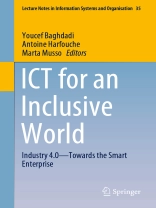This book discusses the impact of information and communication technologies (ICTs) on organizations and on society as a whole. Specifically, it examines how such technologies improve our life and work, making them more inclusive through smart enterprises. The book focuses on how actors understand Industry 4.0 as well as the potential of ICTs to support organizational and societal activities, and how they adopt and adapt these technologies to achieve their goals.
Gathering papers from various areas of organizational strategy, such as new business models, competitive strategies and knowledge management, the book covers a number of topics, including how innovative technologies improve the life of the individuals, organizations, and societies; how social media can drive fundamental business changes, as their innovative nature allows for interactive communication between customers and businesses; and how developing countries can use these technologies in an innovative way. It alsoexplores the impact of organizations on society through sustainable development and social responsibility, and how ICTs use social media networks in the process of value co-creation, addressing these issues from both private and public sector perspectives and on national and international levels, mainly in the context of technology innovations.สารบัญ
Part I: Innovative Technologies for an Inclusive World.- Part II: Social Media.- Part III: Impact of Innovative Technologies in Developing Countries.- Part IV: MENACIS 2018.
เกี่ยวกับผู้แต่ง
Youcef Baghdadi is a Professor of computer science. He is currently with the Department of Computer Science at Sultan Qaboos University in Oman. He is the coordinator of the research in the department. He received a HDR degree in computer science from University Paris 1 Pantheon-Sorbonne and a Ph D degree from University of Toulouse 1, France. His research aims at designing artifacts such as frameworks, architectures, methods, models, and processes to bridge the gap between business and IT, namely in the areas of cooperative information systems, service-oriented computing, method engineering for service oriented architecture, e-business, web technologies, social commerce, and ontology for enterprise interactions. He published many articles in journals such as Information Systems (IS), Information Systems Frontiers (ISF), Electronic Commerce Research and Applications (ECRA), E-Business and Information Systems (e-B&IS), Service-Oriented Computing and Applications (ECRA), Business Information Systems (IJBIS), Web Grids and Services (IJWGS), and others. Prof. Youcef Baghdadi is also involved in several editorial boards and a member of TCP of many international conferences.
Antoine Harfouche is an Associate Professor of Information Systems and Digital Business at Paris Nanterre University (UPN). He teaches Information Systems, Big Data analytics, Digital Business, Artificial Intelligence, and Quantitative Methods (Statistics and Data Science) for undergraduates, graduate and Ph D students. His research areas revolve around artificial intelligence and management and digital business. His publications appeared in peer-reviewed journals and renowned conferences such as Information Technology and People, Recherche et Application en Marketing, Journal of Organizational and end user computing, and the International Conference for Information Systems.Antoine Harfouche is member of the Association for Information Systems (AIS). He is the Past President of the MENA-AIS chapter, the President of the Lebanese AIS chapter (LAIS), and the past president of the international association ICTO (Information and Communication Technologies in Organizations and Society).
Marta Musso, Ph D, is a young researcher at the University of Cagliari, Italy. Her research topics include Information Technologies impacts on businesses, E-health, value co-creation in healthcare, telemedicine. She is also developing studies for networks in healthcare particularly referring to managerial and organisational aspects. She is a member of the ‘Telemedicine Economic Evaluation Group’ for Italy. Prior to beginning her doctoral studies, she worked as a business consultant and a chartered accountant.












